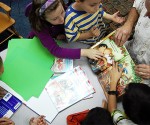Despite More Tech Use, Australia Computer Literacy Skills Decline
Results of national information and communication technology tests show that computer literacy skills have declined across Australia over the past three years despite an increase in the use of laptops and iPads.
The tests, taken by over 10,000 students in years 6 and 10 from 650 government, Catholic and independent schools every three years since 2005, require students to perform basic computer literacy tasks considered to be important for future employment and social interaction such as creating a new email folder and opening a hyperlink in a separate tab.
“The purpose is not to measure whether you can be an IT tech, it’s whether you can use technology in [day to day work]” ACARA’s general manager of assessment and reporting, Dr Stanley Rabinowitz said.
The results, released by the Australian Curriculum, Assessment and Reporting Authority, show only 55% of year 6 students in the country are considered to be IT literate, despite 98% of students reporting access to a computer at home. In 2011, 62% tested proficient. Only 52% of year 10 students met proficiency levels in the last testing period compared with 65% in 2011, reports Bethany Hiatt for Yahoo News.
Test results show a significant drop in the average performance of year 6 students, whose scores dropped 22 scale points in 2014 in comparison to the last time the test was administered in 2011. In the same time span, year 10 student performance dropped 39 points.
Year 6 students were required to perform tasks such as searching a website for information, formatting a document, cropping an image and creating a slideshow. Meanwhile, year 10 students were asked to create an online survey, use software to add new levels to a video game, and to design an animated video.
Boys were found to display more confidence in their digital skills, although girls tended to actually be more technologically literate, with 60% of girls reaching competency levels in comparison with 51% of boys, writes Timna Jacks for The Age.
ACARA’s chief executive officer Robert Randall suggests that schools are assuming students are learning higher-level ICT skills because students are frequently seen using devices for communication or playing games. Randall went on to say the results were cause for concern and that schools need to establish a new focus on increasing technology skills, writes Eryk Bagshaw for The Batemans Bay Post.
Randall expects better results when the test is administered again if states make use of ACARA’s digital technologies curriculum.
ACARA expects year 10 students to be able to edit fonts and animations, create charts and tables, make use of the “history” tab on a web browser, and sort data on a spreadsheet. Meanwhile, year 6 students should be able to find certain information on the internet, edit a document, copy and paste information, bookmark a webpage, ensure virus protection information is up to date, and keep good posture while using a computer.
The National Assessment Program (NAP) differs from the National Assessment Program Literacy and Numeracy (NAPLAN) test, which tests every Australian student in year 3, 5. 7, and 9. NAP tests information and computer technology literacy in an effort to offer information to education policymakers pertaining to how students are learning.
Author information
The post Despite More Tech Use, Australia Computer Literacy Skills Decline appeared first on Education News.











